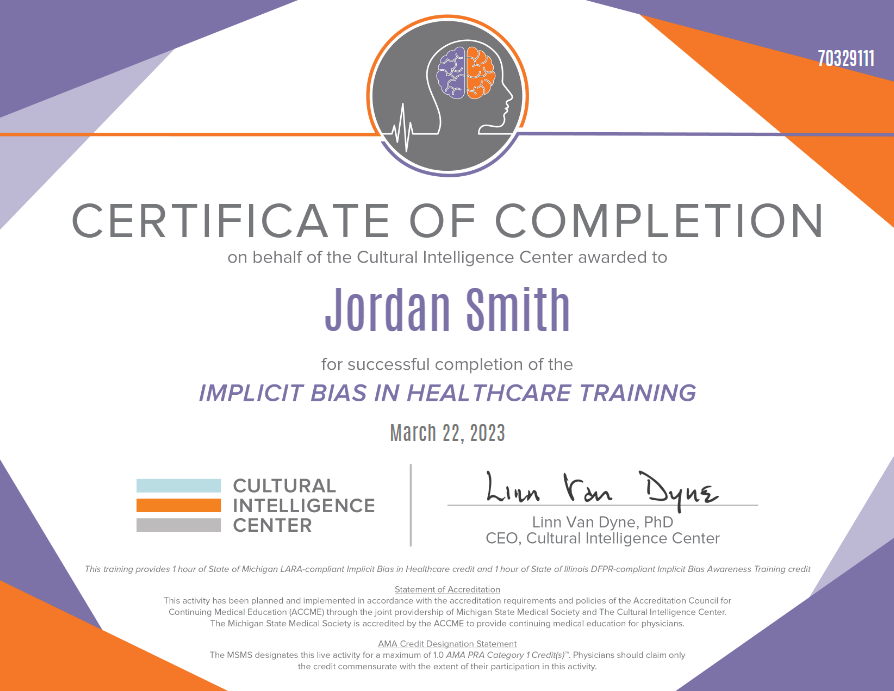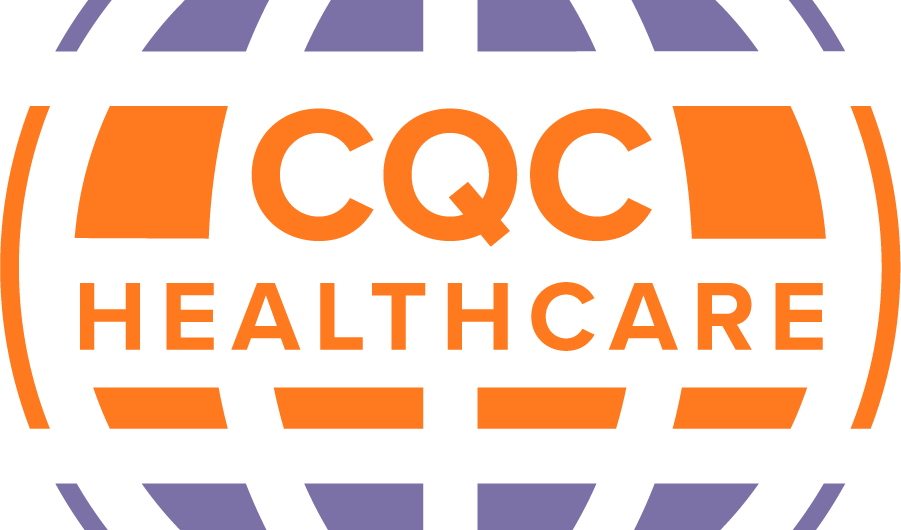
Implicit Bias in Healthcare Online Training – 1 HR
The Implicit Bias in Healthcare Online Training is a 1-hour virtual program. It includes six modules of online discussions about implicit bias in health care, which can be completed as your schedule allows.
1.0 AMA PRA Category 1 Credit(s)™
Statement of Accreditation: This activity has been planned and implemented in accordance with the accreditation requirements and policies of the Accreditation Council for Continuing Medical Education (ACCME) through the joint providership of Michigan State Medical Society and The Cultural Intelligence Center. The Michigan State Medical Society is accredited by the ACCME to provide continuing medical education for physicians.
AMA Credit Designation Statement: The MSMS designates this live activity for a maximum of 1.0 AMA PRA Category 1 Credit(s)™. Physicians should claim only the credit commensurate with the extent of their participation in this activity.
Nurses: The ACCME is approved by the Board of Nursing as an acceptable provider of continuing education for license renewal or re-licensure. Note: We urge you to keep this certificate in your files for audit purposes.
- Additional Training Highlights:
- IDPFR compliant 1 hour, Self-paced e-Learning Program
- Available On-Demand 24x7
- Written by experts in Cultural Intelligence (CQ®) and Implicit Bias
- Non-polarizing language
- Pre & Post Implicit Bias Surveys (as required by IDPFR)
- Certificate of Completion
LARA Approved
New Life Skill
Completion Certificate
No Shaming
Builds Confidence
You Will Receive
Pre- and Post-Survey to test your awareness of Implicit Bias
Take an Implicit Bias assessment at the very beginning of the program to establish a baseline. Retake the assessment after you have completed your training to compare the two scores to show learning has taken place.
Pre- and Post-Survey Feedback Reports
A report that details results from both surveys and the comparison between your Pre-assessment results and your Post-assessment results.
1 hour Self-paced Digital Program
The Implicit Bias in Healthcare Online Training provides healthcare practitioners and professionals with an understanding of implicit bias (often called unconscious bias) and explicit bias. This online training explains how to manage your bias during interactions with diverse patients, practitioners and peers.
Downloadable Credential
A downloadable sharable credential you can embed in your email signature, print out, or use however you wish.
Hear What Others Say
"Thank you so much for this training, this has been both informative and interesting, a great way to self-improve"
"I can use CQ strategies, drive, knowledge and action points to address micro-aggressions and implicit bias to make health care delivery more equitable for all."
"I feel more confident identifying micro aggressions, and feel enabled to eliminate them for myself and others"
"Using CQ and providing microaffirmations to help eliminate bias in the work place"
"I wasn't looking forward to this, but I liked the way it was presented. All are things I've noticed and tried to give the best care and compassion to all of my patients whatever their backgrounds were. I do think it's good for people to be aware of their behaviors, most people don't do self-examinations."
"This has probably been the best course I have taken in a very long time and have enjoyed all the chat as well"
"We all have cultural biases and I learned how to address them appropriately by using cultural intelligence."
"Thank you so much for this training! I will bring this back to my work and ask the institution to require this for all staff."
"I loved learning about micro-affirmation and plan to use that in my workplace. It provides me with a better way to handle it without ignoring it."
"I learned how to be more aware of the things I have previously allowed myself to think or act when caring for patients and how to use micro affirmations"
"This training has been great! Thanks so much for providing it!"
"Its important to be an advocate for CQ and promote CQ to your coworkers"
"The most important thing I learned was the difference between equality and equity. Good example"
"This information was fantastic. Learned new term: microaffirmation."
"We are all inherently biased as human beings. Reflecting on our biases and what we do with those is what’s important. Learning and growing by taking courses like this can make the difference."
"This presentation was very thought provoking"
"very insightful and learned a good deal to apply in practice, thank you!"
"The most important things that I learned about were system 1 and system 2 based thinking. Now I know it is important to transition to system 2 thinking when we interact with others especially patients."
"Be aware and apply - Drive, Knowledge, Strategy, Action - a great model!! Disrupt Bias!"
"Thank you so much for this course. You really did a great job explaining the information with clarity and understanding"
"cq is building blocks and I can get better at it with daily practice."
"Thank you, I appreciate the thought and time you put into developing this webinar"
"The most important thing that I learned today to be mindful of the verbiage that you are using when conversating with people as they may perceive it to be meant in a different way than what you mean. Take a deep breath and think before you talk. Defining equity and equality was eye opening to say the least"
"Thank you for the informative training and study packet. Well done!"
"it was a refreshing and insightful instruction and thank you"
"I think one of the most important take aways is that we all have a duty to hold each other accountable in regards to implicit bias"
"challenge our own thinking and accept when we might be the problem. Assume positive intent when possible. even with colleagues."
"I think one of the most important take aways is that we all have a duty to hold each other accountable in regards to implicit bias"
"This was very informative. Yes, we all have biases, but you have given very useful information on how to manage them."
"Thank you! This has been great topic and webinar"
"Thank you for a great presentation. Eye-opening."
"This session made me to think broader"
"Thank you for so much information and thought-provoking ideas"
"Thank you! Great job!! Very very interesting! Well done!"
"Thank you for the information and great resources"
"thank you, this was very thought provoking"
"Way we can utilize CQ in our careers"
Purchase Your
Implicit Bias in Healthcare Training Course
Now!
Please fill out the form to complete your purchase
Your cart is currently empty. |
| Subtotal | $0 |
|---|---|
| Total | $0 |
Your cart is currently empty. |
| Subtotal | $0 |
|---|---|
| Total | $0 |
If you have questions about the training or would like to see if you are eligible for a discount on the training, we recommend reaching out to us at info@culturalq.com.
“Implicit bias (IB) in health care is such a relevant topic at this time. IB is a barrier to diversity and health equity. As a nurse educator, I have the responsibility to ensure that future nurses are informed and aware of their unintentional discrimination and the impact it has on health outcomes.”
Lynn Schmidt Ph.D., RN, CNE Dean, School of Nursing and Kinesiology at Anderson University and CQ Certified Facilitator

